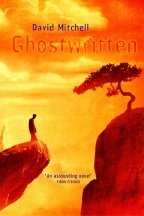 Scripts involving sets of cleverly intersecting personal narratives − we're talking stuff like Crash and Magnolia here− are amongst the most admired and studied at filmschools. And yet I've always imagined that these kind of stories would actually be easier to write, because they surely save you from having to tackle the hard part of any one of the separate narrative threads. Ghostwritten, David Mitchell's first novel, has served to re-confirm this little prejudice of mine.
Scripts involving sets of cleverly intersecting personal narratives − we're talking stuff like Crash and Magnolia here− are amongst the most admired and studied at filmschools. And yet I've always imagined that these kind of stories would actually be easier to write, because they surely save you from having to tackle the hard part of any one of the separate narrative threads. Ghostwritten, David Mitchell's first novel, has served to re-confirm this little prejudice of mine.There are nine nearly-stories told in ten chapters. There's a theme that doesn't quite over-arch enough, and some of the connections are very arch indeed. And there are loads of good bits.
In the early chapters set in Asia I had to remind myself a couple of times that I wasn't reading translated literature − one of the Japanese characters makes a pun that would only work in English. The first clear sign that the many dazzling passages are going to be offset by clumps of deadening mediocrity occurs in the chapter set around the Hermitage in St Petersburg. I visited the museum in '84 and '85 and was expecting Mitchell to capture something of the mood of this singular space, but the action he describes could be taking place in any major art gallery around the world. The narrator does keep looking out the window in order to describe the weather and visible rooftops outside, but this is generally rather clumsy stuff. (She also produces this cringeworthy metaphor: "The minutes are hauling themselves by like a shot Hollywood gangster crawling down a corridor.")
Nevertheless, I will remember this book mostly for its self-contained gobbets, and have here reproduced a representative selection:
"The most malicious God is the God of the counted chicken."
"Memories are their own descendents masquerading as the ancestors of the present. "
"The world runs on strangers coping."
"Lunatics are writers whose works write them."
"London's middle-aged and male, respectably married but secretly gay."
"Money is another one of those inner places...it's a way to measure yourself."
And...
"If you're in your life, chance. Viewed from the outside , like a book you're reading, it's fate all the way,"
...an important observation, and I will return to it later when I post my comments on John Carey's relativist polemic What good are the arts?

No comments:
Post a Comment